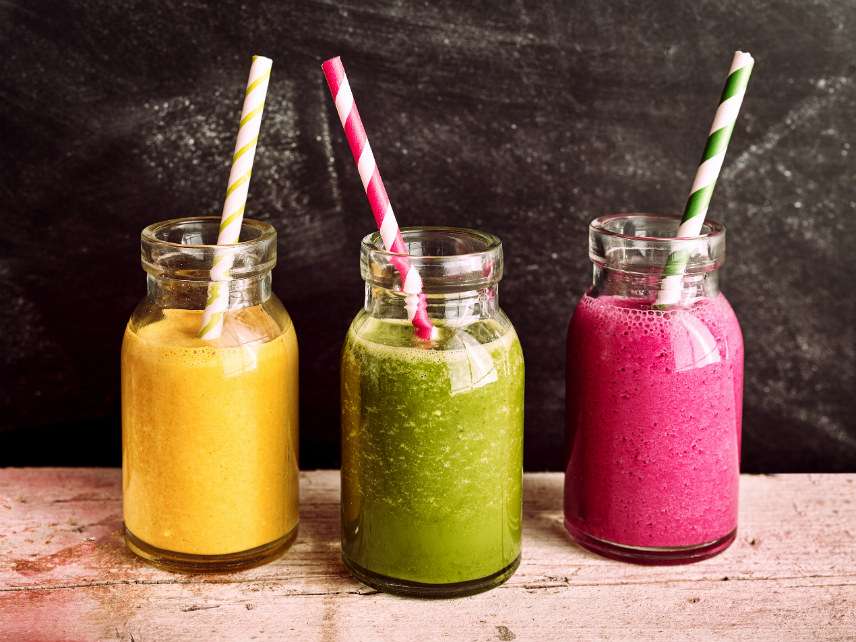New York the Latest City to Take Aim At Plastic Straws
Momentum to ban these convenient suckers keeps growing.

Now New York City is considering a plastic straw ban.
On Wednesday, three Democrats on city council—Rafael Espinal of Brooklyn, Helen Rosenthal of Manhattan, and Barry Grodenchik of Queens—introduced a bill that would prohibit restaurants, bars, and other food service businesses from giving customers single-use plastic straws.
Businesses would be fined $100 for the first violation, $200 for second, and $400 for any violations thereafter. A medical exception would allow restaurateurs to hand out straws to anyone with a disability—including, oddly, people whose disabilities do not have any effect on how they drink their beverages. Everyone else would have to suck it up.
Espinal, along with John Calvelli of the Wildlife Conservation Society and Adrian Grenier of HBO's Entourage, try to justify the proposal in a New York Daily News op-ed, arguing that plastic straws are both an environmental menace and easily replaceable.
"While plastic straws are among the most common litter found on beaches, they are also among the hardest plastic to recycle and the easiest to replace," wrote the trio. "Alternatives to plastic straws made of paper, bamboo, metal or glass are readily available. Consumers can even skip the straw altogether."
In my own Daily News op-ed, I push back against both arguments. Straws, I note, are hardly the biggest problem when it comes to beach litter:
Straws make up a pretty small portion of plastic waste overall. Results from California's yearly coastal clean-up find that straws are about 4% of all beach debris collected. In Vancouver it's 3%. In the UK, straws are just 2% of all beach refuse.
And while plastic getting into the oceans is a big problem, it's not a particularly American problem:
The U.S. as it turns out does a pretty good job of disposing of the waste we produce, making us responsible for less than 1% of plastic going into the oceans. That's compared to countries like China, which contributes almost 28% of yearly plastic marine debris, or Indonesia, responsible for another 10%.
As one chemical engineering professor put it to National Geographic, "Let's say you recycle 100 percent in all of North America and Europe. You still would not make a dent on the plastics released into the oceans. If you want to do something about this, you have to go there, to these countries, and deal with the mismanaged waste."
Straw bans in a couple coastal cities will be of even less help to the environment. But they would do a good job of inconveniencing customers and ruining businesses for whom plastic straws are a crucial component of the drinks they service. As I wrote in the Daily News:
There are those drinks that would be rendered hopelessly impractical in a straw-free world, from the standard milkshake to your favorite whipped-cream topped beverage from Starbucks. Bubble tea might disappear entirely without the straws needed to slurp up the tapioca balls at the bottom of the cup that give the beverage its name.
Indeed, bubble tea merchants were some of the strongest opponents of Vancouver's straw ban, with one tea house manager telling the city council, "our industry depends on straws. This ban will be detrimental to many businesses in our city.
"Who's going to pay more money for a metal straw?" one New York bubble tea shop manager tells Reason, adding: "It's impossible to suck up a bubble through paper."
Reusable straws really aren't practical for drinks that more often than not are consumed on the go. But for straw opponents, these bans are starting to take on a self-justifying momentum. In the words of Espinal and co.: "California is also looking to implement a statewide ban. For the sake of our environment and ecological future, New York City must be among these progressive champions." Gotta keep up with the progressive Joneses.
Rent Free is a weekly newsletter from Christian Britschgi on urbanism and the fight for less regulation, more housing, more property rights, and more freedom in America's cities.

Show Comments (60)